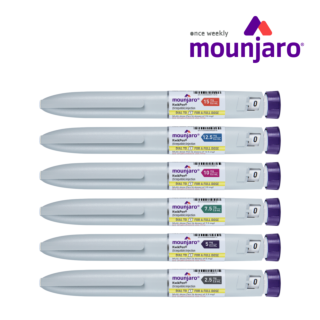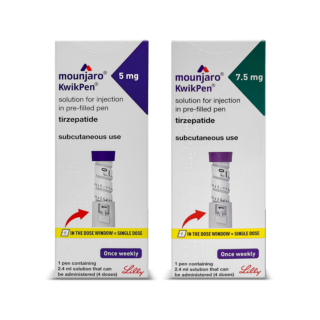Getting Into the Exercise Mindset
Starting exercise during your weight loss journey can feel intimidating. Many people worry about where to begin, how they’ll look, or whether they’ll keep it up. These feelings are normal - they don’t mean you’re unmotivated.
This guide explores how to build the mindset that makes exercise feel rewarding, not punishing. It’s about finding confidence in movement, learning to listen to your body, and creating habits that fit into the rest of your life.
Three key takeaways
- Exercise is about mindset as much as movement - confidence comes from consistency, not perfection.
- Small, realistic steps build lasting progress.
- Every bit of movement counts. When you move because you want to, not because you have to, exercise becomes enjoyable.

Why the right mindset matters
Exercise often feels like something you “should” do rather than a choice, but changing your mindset can help with motivation. Viewing activity as self-care rather than an obligation helps make it part of your routine, instead of a chore.
For people using treatments like Mounjaro or Wegovy, improved energy and mobility can make it easier to get started. This is the ideal time to try gentle movement – small steps can build momentum and boost confidence quickly.
Common barriers to exercise and how to overcome them
“I don’t know where to start.”
The first step doesn’t have to be big. Start with 10 to 15 minutes of walking, light stretching, or beginner yoga. The goal isn’t intensity – it’s consistency. Choose something that fits into your life easily, even if it’s just a few minutes at a time.
The NHS recommends at least 150 minutes of moderate activity per week, but you don’t need to reach that straight away. Gradually build up as your confidence and fitness grow.
“I feel embarrassed or self-conscious.”
Exercise can feel intimidating, especially in public spaces, but everyone starts somewhere. You don’t need a gym membership or fancy equipment – movement can happen anywhere. Try walking outside, following online workout videos, or swimming, where movement feels lighter and less pressured.
Remember - people are usually focused on their own workouts, not on judging others. Your effort is what matters.
“I don’t have time.”
Movement doesn’t have to take hours. Short bursts of activity add up throughout the day – walking to the shop, taking stairs, or stretching while watching TV all count. Think of it as movement, rather than exercise.
10 minutes of activity can have similar health benefits to longer sessions when done regularly. Build it into daily life rather than waiting for free time.
“I’m scared of failure or injury.”
Starting small helps reduce both fear and risk. Focus on what your body can do right now, not what it used to do. Warm up gently, listen to pain signals, and rest when you need to – rest is part of progress, not proof of failure.
If you have existing health conditions, talk to your GP or pharmacist before beginning a new exercise routine. They can recommend safe, gradual ways to increase activity.
“I’ve had bad experiences with exercise before.”
Many people associate exercise with guilt, punishment, or pressure from past diets. Movement isn’t about punishment – it’s about progress.
Reframe it as something that supports your health and mood, not something that judges your worth. You’re not “starting over”; you’re starting differently.
Finding motivation when you don’t feel like moving
Motivation doesn’t always come first – sometimes, action creates it. Try setting one small, achievable goal – a short walk, a stretch before bed, or dancing to one song. Once you start, it’s easier to keep going.
Track how movement improves how you feel, not just what you weigh. Notice better sleep, steadier energy, and lighter mood. Use music, podcasts, or fitness apps to keep it enjoyable and engaging.
Building confidence in movement
Confidence grows with every success, no matter how small. Choose activities that feel manageable and enjoyable rather than intimidating.
Focus on the benefits you feel – better mood, more energy, or reduced stress – instead of how you look. When you keep promises to yourself (e.g. “I’ll move today”), you build self-trust, not perfectionism.
Listen to your body
Weight loss treatments can change appetite and energy levels from day to day. That’s normal. Some days you’ll feel energised, other days your body will need to rest.
Over time, movement can also ease mild side effects such as constipation or fatigue by supporting digestion and circulation. The goal is balance, not burnout. Exercise should support your wellbeing, not drain it.
Redefine what counts as exercise
Exercise doesn’t have to mean the gym. Everyday movement has real health benefits.
Try:
- brisk walking
- gardening
- cleaning the house
- dancing in your kitchen
- swimming or water aerobics
- yoga or Pilates for beginners
What matters is consistency. If it gets your heart rate up and makes you feel good, it counts.
Turning movement into a habit
Habits build through repetition, not intensity.
- Set a regular time each day – after lunch, before dinner, or on your commute.
- Pair movement with an existing routine, like walking while listening to a podcast.
- Track your activity with a journal or app to see progress over time.
Missing a day doesn’t erase your effort – restarting the next day is the habit.
The mental health connection
Exercise doesn’t just strengthen the body – it supports the mind. Regular movement helps reduce anxiety, ease symptoms of mild depression, and improve self-esteem by releasing endorphins and serotonin.
Even before visible changes occur, movement boosts body confidence and helps shift focus from appearance to wellbeing. Every step, stretch, or swim strengthens both body and mind.
The long-term view
You don’t need to become a fitness expert to benefit from movement – you just need to stay consistent. Exercise is a lifelong tool for better health, not a punishment for past habits.
As you continue treatment, increased energy and mobility can help you explore new types of movement, from swimming to strength training. Find what brings you joy and keep building from there.
Frequently asked questions
How do I start exercising if I haven’t done it in years?
Begin with short, low-impact activities like walking, stretching, or beginner yoga. Start small and build gradually to avoid injury and increase confidence.
What is the best exercise for beginners on weight loss injections?
Gentle, steady activity such as walking, swimming, or cycling works best. Focus on consistency rather than intensity.
How much should I exercise when starting Mounjaro or Wegovy?
Aim for 150 minutes of moderate activity per week, as recommended by the NHS, but start lower and build up as your body adapts.
Can I exercise while dealing with side effects?
Yes, but listen to your body. Take rest days if you feel unwell, and stay hydrated. Light movement can help with side effects like fatigue or constipation.
What counts as exercise if I’m not ready for the gym?
Anything that gets you moving – walking, gardening, cleaning, or dancing all count. The goal is to move more throughout the day.
Is walking enough to lose or maintain weight?
Yes. Brisk walking improves heart health, supports fat loss, and boosts energy. Combine it with balanced nutrition for best results.
How can I stop feeling embarrassed about exercising?
Remind yourself that everyone starts somewhere and most people are focused on themselves. Choose environments or activities where you feel comfortable.
Should I worry about weight gain when building muscle?
No. Muscle weighs more than fat but takes up less space. Building muscle increases metabolism and supports long-term weight maintenance.
Sources
- Physical activity guidelines for adults aged 19 to 64 (2024) NHS [accessed 03 November 2025]
- 10 minutes brisk walking each day in mid-life for health benefits and towards achieving physical activity recommendations (2017) Public Health England [accessed 03 November 2025]
- Semaglutide for managing overweight and obesity (2023) NICE [accessed 29 October 2025]
- Stress, cortisol, and other appetite-related hormones: Prospective prediction of 6-month changes in food cravings and weight (2017) National Library of Medicine [accessed 03 November 2025]












